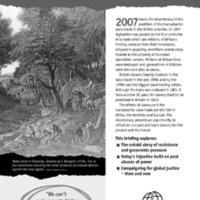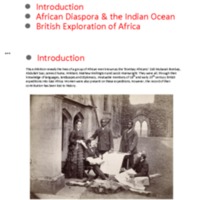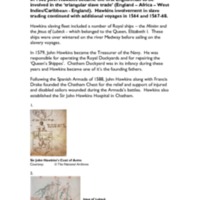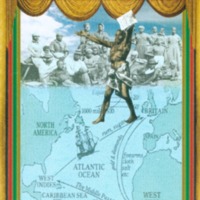
200 Years On: The legacies of enslavement and abolition
The World Development Movement seeks to increase awareness of political views in regards to world economic and social development. The organisation published a briefing in 2007 to mark the bicentenary, exploring the stories of grassroots pressure and the historic and modern campaigns for global justice. In collaboration with the University of Leeds, the World Development Movement also organised two public events looking to explore the lessons to be learned from the struggle to end the slave trade and examining contemporary campaigns in Africa and beyond for global social justice. Speakers included the Kenyan writer and academic Ngugi wa Thiong'o.

Bombay Africans
Bombay Africans 1850-1910 was exhibited at the Royal Geographical Society as part of the wider ‘Crossing Continents: Connecting Communities’ project, which with community partners aimed to develop new resources to advance the importance of geography. Based on the research of Clifford Pereira and with community consultation partners, Bombay Africans explored the histories of a group of African men who assisted British explorers such as John Hanning Speke, Richard Burton and David Livingstone on mapping expeditions in East Africa in the late 19th century. The name 'Bombay Africans' was given to Africans who had been rescued from the slave ships operating in the Indian Ocean. The exhibition examined the roles of these men in the anti-slavery movement and in Christian organisations like the Church Missionary Society. Focusing on the East Coast of Africa and the slave trade routes in the Indian Ocean, the exhibition also explored enslavement, forced migration, liberation and the African diaspora in the Asian subcontinent.

Freedom 1807: The Chatham Dockyard Story
The Historic Dockyard Chatham opened a new exhibition in 2007 to look at the history of Chatham in the context of the transatlantic slave trade. The exhibition examined dockyard ‘founder’ John Hawkins - the leader of the first English expedition to transport West African people to the Americas - the work of Chatham-built ships in policing the slave trade post-abolition, and the hidden history of people from ethnic minorities who served in the Royal Navy or worked in the naval dockyard, from the 18th century to the post-Second World War period. The exhibition also looked at Chatham's links to Indian shipbuilding. HMS Gannet (1878), preserved alongside two other historic warships at The Historic Dockyard, is the only surviving British warship to have taken part in the suppression of the slave trade off the coast Africa during the 19th century. Between 1885 and 1888 Gannet undertook anti-slavery patrols in the Red Sea, intercepting Arab slave traders operating off the East Coast of Africa, around the Gulf and the Indian Ocean.

Leeds Bicentenary Transformation Project
This collaborative community initiative celebrated African and Caribbean culture in Leeds, with a focus on commemorating the Abolition Act by 'highlighting African achievement, liberation and aspirations'. New exhibitions, publications and resources were produced and over 100 bicentenary events organised under different themes: Education and Museums; Arts and Carnival Culture; Churches and Abolition; Legacy; Black History and Community Development; Media and Communications. Highlights included the photographic exhibition and pamphlet 'From Abolition to Commonwealth', which remembered indentured labour in Africa and the Caribbean after 1807, and the 40th anniversary of Leeds West Indian Carnival, with themes that highlighted heritage, liberation, respect and freedom. Project outputs included an education pack, black history classes, concerts, church services, lectures and performances.